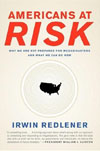September is National Preparedness Month
September is National Preparedness Month according to the U.S. government. A whole pantheon of organizations are joining together to promote preparedness, from the expected, such as Homeland Security and the Red Cross, to some you likely never heard of.
Perhaps a little publicity, nightly news stories and community led efforts will help jump start those who seem inclined to procrastinate or simply ignore their responsibility. It is a responsibility, after all. Beyond being responsible for yourself and your family, its also a responsibility to society. While individual tragedies are horrific when disaster strikes, the cost to our community and country is huge, and far higher than it ought to be. The tragedies of Hurricane Katrina and September 11 are still vivid in our memory, but has it motivated you to do anything? Preparedness is everyone’s personal responsibility.
As noted last month, a recent Time article, Why We Don’t Prepare, chronicled how few people are prepared or feel even the need to do so. They not only cheat themselves, they cheat their neighbors and we all, every one of us, pay the price. I am so tired of paying for their failure to take responsibility for themselves.
 Since then, other similar articles and the like have been appearing. Diane Rehm had Dr. Irwin Redlener, the director of The National Center for Disaster Preparedness at Columbia University and author of “Americans at Risk” on her show August 25th. Redlener is highly critical of government preparedness efforts since 9/11 and while he a bit over the top at times, as many pundits are, this interview might be enlightening and the book makes for a good read and makes solid points for the most part, even if it is a wee bit politicized and somewhat hyperbolic at times. Purchase “American’s At Risk” through this link and support the Equipped To Survive Foundation.
Since then, other similar articles and the like have been appearing. Diane Rehm had Dr. Irwin Redlener, the director of The National Center for Disaster Preparedness at Columbia University and author of “Americans at Risk” on her show August 25th. Redlener is highly critical of government preparedness efforts since 9/11 and while he a bit over the top at times, as many pundits are, this interview might be enlightening and the book makes for a good read and makes solid points for the most part, even if it is a wee bit politicized and somewhat hyperbolic at times. Purchase “American’s At Risk” through this link and support the Equipped To Survive Foundation.
Max Mayfield, the retiring chief of NOAA’s National Hurricane Center discusses his fears in an article that appeared on MSNBC, “Megadisaster is coming.” As Mayfield points out, a recent study found that “60 percent of people in hurricane-prone U.S. coastal areas have no hurricane plan.” He goes on to say ““I think the day is coming. I think eventually we’re going to have a very powerful hurricane in a major metropolitan area worse than what we saw in Katrina and it’s going to be a megadisaster. With lots of lost lives.”
In the event you are reading this little diatribe and have not yet taken steps to be prepared, let me exhort you to get your proverbial you-know-what in gear and get with the program. Being prepared for a disaster is no different than buckling your seatbelt, it’s the only rational thing to do to help yourself. The Equipped To Survive web site is a great place to start and we’ve got the perfect article to get you going, how to prepare your own 72-Hour Kit. It’s neither expensive nor difficult, especially if you do it over time.
Most of you reading this are already believers. You are already members of the Church of Preparedness, so to speak. The question then becomes, how do you make converts of the others around you, those who snicker at your Every Day Carry gear, your trunk full of preparedness gear and supplies and your Bug Out Bag?
I wish I had a really effective answer, but it is difficult. It seems that it is human nature for a significant percentage, apparently a majority, of people to stick their head in the sand. Given that unfortunate reality, the best one can do is to lead by example.
Beyond that, take advantage of every opportunity that the news provides to point out how much less tragic the news would be had those involved been better prepared. The sad thing is, there’s no shortage of examples to point to, so you won’t run out of opportunities to make your point. However, be careful not to come across as a fanatic, make your points in a low key manner and use humor when possible. You’ll only turn people off if you sermonize or are condescending.
Being a missionary for the Church of Preparedness can be a thankless job at times, but it is through such efforts that the blind will be led to see the truth: Preparedness is everyone’s personal responsibility.
